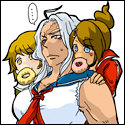|
Like, making a game setting bible is great and all, but maybe don't include it in the game, and definitely don't force people to read through to verify that you included no salient information in it. If I had to read a longass history booklet before starting Fallout I'd probably delete it immediately. Which is why the game starts with "war, war never changes" and just lets you explore the setting at your own pace.
|
|
|
|

|
| # ? Apr 23, 2024 22:48 |
|
poo poo like that is why some nerds end up failing all their classes (and socially). They learn trivia that are just plain wrong and manage to remember it better than actual facts or critical thinking skills.
Speleothing fucked around with this message at 08:01 on Jun 14, 2018 |
|
|
|
Dunno, I think people in general just like to latch on to weird tidbits of information, especially factoids. No one in my family has any love for history but they are full of random, questionably sourced facts about historical figures and events. "Did you know Hitler is alive in Argentina?", "Did you know the Tiger was the best WW2 tank?", "Did you know the word Aboriginal is latin for "hobo"?, "Did you know hair grows thicker the more you shave it?", etc. Also, I plan to keep covering the Iron Kingdoms material (both from the new AND the old game) as soon as university stuff relents a bit. Azran fucked around with this message at 09:13 on Jun 14, 2018 |
|
|
Azran posted:Dunno, I think people in general just like to latch on to weird tidbits of information, especially factoids. No one in my family has any love for history but they are full of random, questionably sourced facts about historical figures and events. "Did you know Hitler is alive in Argentina?", "Did you know the Tiger was the best WW2 tank?", "Did you know the word Aboriginal is latin for "hobo"?, "Did you know hair grows thicker the more you shave it?", etc. I think there's a joy in mastering something and it can be very easy to master something relatively small and trivial. It is harmless if you just treat it as that, or perhaps as an anchor point for other things.
|
|
|
|
|
Speleothing posted:poo poo like that is why some nerds end up failing all their classes (and socially). They learn trivia that are just plain wrong and manage to remember it better than actual facts or critical thinking skills. I can’t remember my mom’s birthday, but I can remember where Bullwinkle went to college. 
|
|
|
|
Warhammer Fantasy Roleplay: Realms of Sorcery Student Loan Debt If the first period of a student's study isolates them so they can focus on their magical abilities, the second period punts them out into the world with no means of supporting themselves, crippling student loan debt, and technically a legal demand that they not come back for several years. They are sent out into the world with a letter from their master stating their master's name, address, and Order, a small amount of money (which they are expected to pay back), and if they did well as an apprentice, some references about where they might find a job to support themselves for this period of their education. The theory behind the Journeying period in a wizard's life is that a young wizard (though most Journeymen are in their late twenties or early thirties) who has proven stable and competent as an Apprentice needs some seasoning and exposure to the 'real world'. As they are not fully licensed yet, a Journeyman's master is still on the hook if their student gets up to trouble out in the world, so Magisters tend to be careful in selecting students to send out. The Order receives a significant portion of the Journeyman's earnings and tends to encourage them to seek out other wizards of their sort out in the world to study under while they work and support themselves. The Hunters also consider it a sacred duty to annoy Journeymen; this is the last period before the wizard becomes a Magister and thus is the last period where it's trivial to stop and search them for black magic, ask them for their license at the drop of a (wide brimmed) hat, and otherwise pester them to remind them the Hunters are watching and scare them straight. Most Orders do not encourage Journeymen to become adventurers, even though it's a natural fit for the position. Remember that in Warhams, an adventurer is looked at as some kind of lunatic hobo (until they're particularly successful and wealthy, anyway) because what kind of maniac gets together with only 3-5 buddies and goes out looking for trouble? Most Magisters would encourage their students to seek a commission with the Imperial Army, or at least join a large and well-funded mercenary company that can also pay the Order for the privilege of having their own 'battle wizard' (who is in fact an overtaxed grad student). The Grey, Amber, Jade, and Light Orders actually encourage ADVENTURE, though; Grey wizards are already tricky hobo mages and know adventurers get up to all kinds of shenanigans they'd want reported back to the Order. Light wizards tend to be idealists and take a more romantic view of the traveling wizard-hero learning a little about the world and maybe the power of friendship. Jade and Amber wizards just think it's good for the kids to get out and about on the road and see the forests. Another important part of the Journeying period is the need to make as much money for oneself as possible. In addition to all the other tests and probably literal wizard duel thesis defenses, a Journeyman has to pay the Colleges back for their education to become a Magister. The amount a Journeyman owes is varied depending on how much the Magisters like them. The Magisters are very blatant about this, sometimes hiking prices specifically to make it impossible to pay for one's license in order to keep someone in the Journeying period until they're 'ready'. A very favored Journeyman will merely be told that they have to give the Order everything they earned on Journey (rather than a specific sum) with the understanding that particularly important objects will be given back as graduation presents after their thesis defense. Journeymen are generally considered full wizards by the people they meet out in the Empire, much to the annoyance of actual Magisters. They are still treated as representatives of their Order and if they do not behave themselves, will find their student loans increasingly burdensome or their licenses revoked. If a Magister feels a Journeyman has not yet learned the lessons they were supposed to learn out in the world, they can send them back out; some Magisters will do so until the Journeyman first starts to show the Arcane Marks of being changed by their Wind. Actual Magisters have finally made it. Once a Journeyman pays their dues, confirms they haven't grown a tentacle or two on their travels, and satisfies their master to sign off on their promotion, they are taken to the College to finish their training. During this time, they are given free leave to study and work as much as they wish, essentially entering a period of working on a graduate thesis and preparing for their final qualifying exams. I'm really not kidding about them being Wizard Grad Students. The final thesis defense for a young would-be Magister is a wizard duel with the head of their examining committee, which the Magister-to-be is not expected to win (though they will be celebrated if they do) and which is explicitly non-fatal. If they show cunning, determination, and properly try to defend themselves, they will be accepted as a full Magister of their Order. A curiosity of Imperial Magisters compared to other magic users within the setting is how they grow increasingly incapable of actually working with any Wind besides the one they chose. Human Imperial Magisters are also unique in the degree to which their Wind influences them; an elf who is studying Bright magic as their minor apprenticeship may be passionate and courageous, but a human Bright Wizard will grow increasingly reckless and hyperactive, and will even show physical signs like having their hair turn the color of fire or their irises replaced with blazing flames. This only happens to humans, and generally only to the ones who study Imperial magic. It seems curious that this is a unique phenomena among humans who learned a crash-course method of single-wind magic, doesn't it? This is also why so many rogue Magisters turn to Chaos. They can no longer work with 'other' winds without the assistance of outside forces like demons. Becoming a Magister is not the end of a wizard's prospects for advancement, though it does mark the first point in their life where they are finally independent. A Magister dreams of one day becoming a Magister Lord, an honored title that reflects the highest levels of achievement in their Order's art. A Magister Lord has been so thoroughly altered by their Wind and their constant exposure to magic that they simply don't see the world the way normal humans do. More than ever, they cannot shut out the ever-present auras and flows of magic from their Witchsight, and they feel much of the hum and thrum of the world's background magic. By this point of power, a Magister will have done enough deeds and made enough connections that even those outside the Colleges likely know of them and show them the same respect common to high nobles. These are the great and powerful Wizard Lords fielded to defend Imperial armies, or to advise the Emperor himself. Every Magister dreams of the legitimacy, respect, and enormous sums of money they would be due were they to advance to the point of being a Magister Lord. Next Time: The Orders of Magic, and their many plot hooks
|
|
|
|
PurpleXVI posted:Well, probably because by all indications his personality is extremely hostile, combative and insistent on turning every situation into a fight that he has to "win." This means he isn't really capable of making any content that isn't garbage, and it probably also means that working in any sort of proximity to him is going to be an unpleasant experience. It's hard to imagine that the Wick we've been dealing with in everything he's written is any different in this endeavour. Given it's known people had put veiled insults towards Wick in L5R art, that does give credence that he's not a pleasant man to work with.
|
|
|
|
Zereth posted:Oh no
|
|
|
|
echopapa posted:I can’t remember my mom’s birthday, but I can remember where Bullwinkle went to college. ...Puxatawny U, right?
|
|
|
|
Kurieg posted:...Puxatawny U, right? Wossamatta U
|
|
|
|
Warhammer Fantasy Roleplay: Realms of Sorcery An impossible dream The Orders are going to take a lot of updates. Likely one for each Order, as their writeups are detailed and go into their history, what their Winds represent in more detail, and how the Order tries to express their Wind's dream in the world. We start with the White Order, the Light Wizards who work the wind of Hysh. Hysh is the magic of enlightenment and illumination, both literal and metaphorical. Thus it represents philosophy, contemplation, and comfort as well as laser eyes and blinding lights. Hysh also embodies the paradoxical, impossible, and yet valuable hope that one day Chaos can be exterminated entirely, and this is one of the chief duties of the Light Order. They know they can't succeed; their magic uses the stuff of Chaos as it is, and Chaos will always exist, but trying is valuable in and of itself. The world should contain the least possible Chaos. Hysh is the hardest of all the Winds to control because it represents such a broad concept, with so many different metaphorical meanings. In practice, Imperial Magisters narrow it to illumination, abjuration, and healing. Illumination represents both physical illumination and the magic of inspiration. Healing doesn't simply represent healing the body (though Light Wizards can do a little bit of that, and it's very helpful) but also the comfort and conditioning of the mind. Healing represents the aspect of Hysh as a bringer of the light of hope, and also brings the Light Wizards into alignment with the Shallyan Orders. Abjuration is their most famous power: Light Wizards are some of the best demon-hunters and exorcists in the Empire. They are trained to draw out unclean spirits, to fill the being of the afflicted with light to drive out all darkness, and to do all they can to banish the horrors of Chaos back to the hell that spawned them by the application of ordered, reasoned magic to their changeable madness. These wizards also love harmony and structure, and tend to ritualize their magic. Light Magic is not a flight of fancy or a burst of passion, but an ordered, reasoned, and careful work constructed to bring enlightenment. They form their Apprentices into choirs and use group rituals to contain the power of their magic and harmonize the Light wind into place. This structure and reason is necessary to overcome the difficulty of using their Wind, but it also makes the Light Wizards much less vulnerable to corruption and Chaos. This is why when the Orders were formed, Teclis charged the White Order with destroying Chaos. They can't, and again, they know they can't, but they are to lead the way and inspire others by trying. They were also charged with trying to drive out darkness with light, rather than fire; from the early days the Crusade of the White Order has been about precise, targeted strikes on cult magi and demonic influence, leaving as many of the innocent safe and alive as possible. They were supposed to be an example to all who fight Chaos, that it is possible to defeat its presence in a village or town without burning the whole drat thing down. They express that duty best in their work as exorcists, and the Magisters of the Order travel the Empire in secret to drive off madness and evil that infects its citizens, before violence becomes necessary. They also try to drive out Chaos by enlightenment. Light Wizards are well known as teachers and philosophers, who consider the act of stopping and thinking a valuable end of itself. They are also some of the foremost students of metamagic in the Empire, considering how it is that the Aethyr works how it does, how magic can separate out from Chaos (or indeed, if it can), where one can find the line between the two, and why magic is so drawn to sentient existence. The Light Order is often employed as a source of councilors and scholars, and their overt anti-Chaos abilities have made them generally one of the most trusted of the Orders. In times of war they are called upon to banish demons, but also to inspect the Empire's soldiers. By seeking out and curing Chaos corruption within the armies before they can reach critical mass, the Light Order can prevent dramatic failings of loyalty and acts of sabotage. The Light Order is also charged with watching over many relics and bound horrors that could not be destroyed; sometimes binding a demon in an artifact and holding them in storage is safer than just killing their manifestation and sending them home. Magisters of the White Order are rational, like the Gold Order, but are less concerned with facts and figures and more with the orderly process of thought and rhetoric. They care as much (or more) about how a conclusion came about than what the conclusion might be. They also tend to be very self controlled, often to a fault. They can sometimes be so concerned with avoiding 'chaotic' displays of overt emotion and extreme passion that they can come off as emotionally deadened, an effect that only grows as they become more and more influenced by their Wind. A White Magister can also grow too concerned with putting the world into Light and Shadow, and they must take care not to become too obsessed with the idea of destroying all Evil. Strangely, for one of the most difficult Winds and a Wind that specifically swears its followers to celibacy, they have the most Apprentices and aspirants of any Order. This is partly because they are famous and well-regarded, and partly because they need huge numbers of Apprentices to serve in the binding choirs and rituals guided by the experienced Magisters. Their association with Shallyans means they are welcome in the orphanages of the Empire's cities, and they draw many of their recruits from the Empire's abandoned children. They produce more permanent Apprentices than any other College, which suits the wizards just fine; they needed the backup singers anyway. Being wizards of Light, their actual College is a magical pyramid hidden in the middle of the city, tucked into a fold in space at the intersection of six leylines. One of the requirements for being a Light wizard is being able to see the College at all, as the illusions and strangeness that hide it can be penetrated by those talented in the perception of Hysh. Those who live in the folds of physical space used to hide the College have to find their way by landmarks and intuition, because the alleys and streets no longer make sense, given that they exist simultaneously as a magical wizard college and a relatively run-down district of a major city on a riverbank. Vesperian Kant is the current Magister Patriarch of the Light College. A merchant's son from Tilea and later Marienburg who taught himself as much as he could after his father disdained education, Kant found himself in the workhouses of Marienburg after his father's business failed and his family was split apart by sickness and suicide. He was eventually discovered as a magical talent during the Light Order's sweeps of the orphanages, and taken into their training. Kant was one of the few Light Wizards who was able to penetrate the schemes of the great traitor and previous Patriarch of Light, the terrible Van Horstmann. He was regarded as a mad paranoiac for suspecting the Patriarch of his Order of Chaos worship, and eventually had to end-run around his order and bring the matter directly to the Grand Theoganist to beg for help. Volkmar being a cool guy, he lent Kant a team of experienced Witch Hunters and his own personal aid, and together they brought Horstmann to light. Kant has been Patriarch ever since. Horstmann is the greatest failure of the Order of Light. Like most Tzeentch worshipers, Horstmann doesn't really have much of a character reason for the things he did; he vaguely wanted more knowledge and eventually let evil into his mind as Chaos usually does. No tragic backstory or anything. Just kind of an overreaching dick and a Chaos God who thought it'd be funny (and useful) to turn the guardian of Light into an evil sorcerer. Horstmann escaped and survived being revealed, and now runs a general Chaos illuminati around the Empire, aided by freed macguffins and dark demons he broke out of the wizard jail under the Pyramid of Light. He's a fairly generic big bad evil wizard who wants to help Chaos because, uh, Chaos, as is usually the case with Chaos. Magister Volans was the first Supreme Patriarch of the Colleges of Magic, and the first Magister Patriarch of the Light Order. He is also one of the only humans in history to be able to perceive High Magic (Perceive, not work). Hailing from the ruined and lawless Border Princes, he had spent decades experimenting with the observation of magic before he was brought in by Teclis' amnesty. Upon realizing the self-restraint and remarkable talent of this human, he and the Loremaster came to be close friends, with Teclis astonished to see that a human of fifty could perceive the harmony of the Winds in such a way. Much of the theorizing on the nature of magic in the book comes from Magister Volans, and he is revered as one of the greatest theorists of magic in human history. He was also one of the first to set down the Colleges' curriculum and patterns of study, with the help of Teclis. The Colleges are Volans' legacy to the world, a testament to his patience and love of study. Next: The Gold Order
|
|
|
|
 Circle of Hands Chapter 1: Original Metal Chapter 2: Iron Folk “Iron Folk” is what you’d call the setting chapter of Circle of Hands. Edwards thinks that what we call “setting” crams too much together, from the broadest social context to specific customs. So this is what he calls the backdrop--the geography and culture of the Crescent Land.  The Crescent Land and Its Regions The Crescent Land is so named because it’s a coastal region surrounding a large bay to the east. It’s mountainous along the northern edge and enjoys a mild climate, with infrequent coastal storms and heavy snowfall only in the mountains. It can be divided into four regions, based on culture and geography--there are no borders, because there’s no rule beyond the local. Tamaryon is the inland region running north-south, a land of plains and rivers and farming communities. Their culture includes the makings of something like a Norse thing, but is constantly disrupted by Amboriyon and by violence spilling over from Famberge. Famberge is made up of forests and swampy coast. It’s by far the most violent region, defined by constant raids, turf wars, and power changing hands by assassination. Amboriyon and Rbaja are deadlocked here, but manipulate and contribute to the ongoing misery. Spurr makes up the southern coastline and is the most developed with regard to sailing, trade, and a settlement big enough to actually be called a town. Power is wielded by many small estates, often exercised via coastal raiding. Rbaja is strong here--some of those estates are run by liches. Rolke is forests and mountains with some coastal fishing villages. Most communities here formed in naturally defensible (i.e. rocky) locations. It’s culturally similar to Famberge, or it was--the young king in Rolke and his Circle Knights are a sharp break from generations of squabbling gentry. The People The Crescent Land is isolated by geography and the low level of development. There is some migration and commerce with the outside world, it’s just not having much impact. The people call themselves the “iron folk.” They’re descended from various peoples who immigrated centuries ago and conquered the native people, called the Pananthuri. They were tall and lean and didn’t forge iron, and haven’t left behind much besides their genetics and a few customs, like tattooing. The Iron Folk are distinguished by light skin (that tans quite dark), tall foreheads, high cheekbones, straight or wavy hair ranging from brown to blonde, and blue or grey eyes, often with epicanthic folds. But there are many exceptions. Someone with unusual features is just that, unusual, as there's no concept of race. If Eckbert has dark skin and eyes and hair, you might call him Eckbert the Black--but only to distinguish him from Eckbert Longshanks and Eckbert the Red Haired. Class, Wealth, and Economy The most important thing to understand about this setting--and the most difficult--is how basic facets of life like work, wealth, status, and identity play out without the rigid codes and institutions that define those things in the modern world. Beliefs concerning property, status, religion, gender, and so on are deep-seated, but there’s no body of law you can point to. So how do people produce and consume? People have a shared expectation that everyone works and is provided for. If you’re part of a community you have daily work, and meals and a place to sleep, and people to share it with. When you need something--clothes, shoes, candles--you ask for what you think is your fair share. But make no mistake, this isn’t a utopia of peasant communes. People disagree, nothing ensures that arrangements are fair, and in any community some people are getting screwed while others live well at their expense. You’re probably thinking, “So everything just runs on a vague consensus of what’s fair? Wouldn’t that just break down into feuding and violence all the time?” It often does. Most people want to live in a world without violence, but when law only comes from community standards and the point of a spear, it’s inevitable. Adding to that, this society is too poor to absorb widespread hardship. In addition to violence from within and without, famine, disease, and natural disasters drive whole villages to poverty and desperation. Class Class isn’t prescribed or even understood, but it’s very real. Edwards avoids using words like “serf” and “lord” because feudalism doesn’t exist. The iron folk can be roughly divided into 4 emergent social classes: Peasants are those who do the least skilled and least desirable labour. Plowing, cleaning, gathering firewood and dung--peasants are everywhere doing these necessary jobs, yet somehow invisible. They rarely travel far, unless for work (such as herders and low entertainers) or fleeing from violence. Freemen aren’t above doing peasants’ work, but typically have some more specialized skills and thus have a voice in organizing and assigning work. With good organization, freemen are a strong base for social activism or a militia that can actually defend a village. Professionals are best understood as people with rare and valuable skills, or contractors for skilled and dangerous work. They are recognized via patronage from gentry and privileged living conditions. Gentry are defined, first and foremost, by not laboring to live. Those who are born into this class have their education based around warring with other gentry. Gentry are the class most varied by region. In Famberge, they are mobs of brutal raiders. In Tamaryon, they emerge as the leaders of clan networks. In Spurr they are the most mercantile: trading-and-raiding seafarers. Rolke is experimenting with the idea of a knightly class based on allegiance to the king rather than background and wealth. (That would be you, the player characters.) Without feudalism, titles like “duke” or “thegn” don’t exist. Many gentry don’t have titles, just famous nicknames. “Chief” is the most common title. “Knight” is a very generic term of respect, while “baron” denotes control of a territory or a fort. A “king” is a chief-among-chiefs, and only temporarily. Being a chief is more like being a village elder, or a mafia boss, than what you and I would recognize as official titles. (Slavery doesn’t exist in the Crescent Land. There simply isn’t the infrastructure to hold lots of people in bondage, so taking captives and forcing them to work for nothing is a good way to get stabbed in your sleep. Even if you could could do it and get away with it, it’s unthinkable that it would be hereditary. This isn’t because of deeply held values of liberty and human rights--it’s just not practical or sensible.) Class is perceived as fundamental, but it’s very mutable from one generation to the next, with as much as 10% of people falling into a different class from their parents. That’s not necessarily progress. Sure, sometimes a promising urchin is mentored by an expert artisan. But wealth and status are often gained and lost by successful raiding, bloody coups, and fleeing from said raids and coups--not to mention famine and disease. Class is also personal: it’s how you present yourself and what you can successfully claim; you don’t get to be considered gentry just because your brother is. (If you’ve ever watched Vikings, consider how Ragnar Lodbrok goes from being a simple farmer to a successful raider, which sets off a violent feud with his lord and creates a bitter rivalry with his own brother. ) Class will be really important when we get to the chapter about how adventures play out. Long story short, people will grant you hospitality, and expect things from you in turn, based on your perceived class.  Law and Justice Law is a matter of customs and community norms. The most commonly recognized and punished crimes are theft, shirking work, passing off inferior goods, betraying family or clan, and all forms of assault. Often, the victim or their family just avenge themselves on the perpetrator, and this is either accepted by consensus or kicks off a new wave of reprisals. When it comes to more organized punishments, prisons aren’t practical. The most common punishment is ostracism, allowing someone to continue to live and work without the benefits of friendship and a voice in the community. The most extreme form of this is outlawry, where a person is stripped of all rights and ejected from the community entirely. This can be an invitation for someone to kill them, or a slow death by exposure or starvation. It’s possible for an outlawed person to start over somewhere else--forty miles away might as well be another country. Clothing and Appearance Although the fit and quality varies by social class, all clothing follows the same basic pattern. Men wear a long, belted tunic-shirt over an undershirt, and trousers for cold weather or appropriate work. Women wear long, often low-cut dresses over a blouse. Many people wear a sewn badge to signify a profession, rank, or family. Both sexes wear cloaks in cold weather. Men cut their hair short or cheek-length. Facial hair is a matter of style, but a clean-shaven face is rare and connotes education. Women mostly braid or bun their hair, with many different styles connoting their social rank. The culture is modest, and moreso for women than for men, but nudity is not taboo. If a man walks in on a woman changing clothes, for example, he’d apologize and leave, but no one would be scared or ashamed. Gender, Sex, and Family Gender roles are deeply entrenched. Women do own property and speak freely, but custom says that a daughter is under her parents’ authority until she falls under her husband’s. This includes sexuality, though in practice people are pretty good at getting around presumed barriers to having sex. Sometimes the outcome is no big deal, and sometimes it ignites grudges and feuds. Women do wield power, either by being the real brains behind their husband’s success, or through outstanding personal skill, usually in combat. Both cases are treated as more rare and unusual than they actually are. The accepted family model is a man and a woman marrying and having children. But the clan, not the nuclear family, is the basic unit of society. When you marry, you join an extended social kinship that goes beyond blood relations, and this is as much or more important than your relationship with your spouse. Not everyone marries and has kids, but everyone is part of a clan. The Crescent Land is tolerant of minority gender identities and sexual orientations--but only tolerance, i.e. there’s no prevailing cultural norm that demands persecution. It doesn’t mean acceptance. Those who don’t conform have to back up their choices with personal charisma or personal force, and those who can’t do that often live short unhappy lives. Childbirth is frequent and special. Most women will have children, and may have as many as ten or more. Of those, perhaps seven will live to adulthood. The women of the iron folk are healthy and tough, and midwifery is an everyday skill. But there’s no anesthesia and no way to staunch bleeding, so the risk is always there in spite of the community’s best efforts. A note on childhood: there are no innocents in the Crescent Land. Everyone who survives to their teenage years has worked, has fought in some way, has made hard choices about sex or had those choices forced upon them, has lost family to accidents, illness, or violence. People cling to their lives and their family without any illusions about fairness, which makes family ties fanatical for better or worse. Childhood education is just what you absorb and are taught by your family. There are no schools or school systems. Gentry do foster their children with distant relations and allies, creating social networks and educational opportunities that don’t exist for others. Though the death rate increases rapidly past 40, those who make it that far stand a good chance of living into their 60s, 70s, even 80s, getting wiser and tougher by the year and dying after a brief but rapid decline. Speaking of which, once an old person starts to decline, people tend to...allow it to happen. It’s not cruel; most people don’t even realize they’re doing it, but it’s basically euthanasia. Speaking of which… Health The Crescent Land is thankfully not a disease-ridden climate; cholera and plague are unknown. Isolation is the best defense. Smallpox threatens communities and influenza culls the vulnerable, but there aren’t enough people doing enough long-range travel to spread epidemics across the land. When an epidemic strikes, the only solution is to quarantine that village. This isn’t a Monty Python movie; people are smart enough to avoid rot and sewage and don’t walk around caked in poo poo. But there’s no understanding of germ theory or even boiling for antisepsis. The iron folk aren’t especially superstitious, but it’s easy for them to see curses and judgements where we would only recognize coincidence and bad luck. Medicine is extremely primitive; people’s idea of medicine is “Grandma Freja says eating garlic is good for your health.” Herbal remedies have no serious antibiotic or immunostimulant properties. Any significant puncture or laceration is going to get infected, and the person either recovers (maybe with a disabled limb) or they don’t. The only real medical practice is euthanasia: brewing hemlock and dosing at intervals, so that someone suffering a lingering, painful decline can instead die peacefully in a few days. Development, Technology, and Goods People live in villages with populations of about 100-500 people, typically part of a larger network of about 2000-2500 people. These larger networks share an ecology of resources, within which people farm and trade produce and livestock and so on. Government can transcend a single village to encompass such a network. (The single largest settlement is the main port of Spurr, which has about 10,000 people including all its outlying areas.) Roads are only created through use or local effort to build bridges and such, so long-distance travel means traveling through unbroken wilderness and pathways known only to locals. People live in cottages and gather in longhouses and halls--sometimes clay, but mostly timber frames with thatched roofs. Gentry build forts, typically only earth and wood palisades, but sometimes with stonework. The land is dotted with centuries-old towers, but the skill and organization to build new brickwork doesn’t exist right now. Farming, as well as herding and fishing, is the core of human sustenance. Everyone farms, but those who do nothing but crude farm work are peasants. If you’re an outlaw or refugee and want to be accepted, it’s not a bad idea to just walk into whatever community work is being done and pitch in with no more than a hello. As for food, it’s extremely local. The Crescent Land doesn’t have maize, but plenty of wheat and rye, which are made into many varieties of bread and porridge. No potatoes, but all kinds of other root vegetables from burdock to turnips. Also many varieties of beans and cabbage. Fruit is mostly berries, grapes, and varieties of peach. Salt and honey are necessary and valuable additives. All kinds of meat are eaten including beef, pork, mutton, poultry, fish and shellfish near the coast, and game meat like venison and hare. A lot of husbandry is following herds seasonally rather than keeping them in one place. The iron folk keep all kinds of animals. Everyone has experience with animal husbandry, and rarely get hurt by projecting human attitudes onto animals. Speaking of which, there’s no concept of animal rights. People adopt some animals as pets (especially dogs and hawks) and animal cruelty is considered disturbing, but animals exist to provide labor, meat, and other products for human benefit. They're likely to be killed once they outlive their usefulness. Fire and fuel are a constant feature of daily life. To the iron folk a home is defined as a building with a hearth, and a fire is always going even if it’s just smoldering embers in the summer. (Wood is thus also an everyday concern: gathering kindling, chopping firewood, and setting aside good timber for furniture and buildings.) Light is mostly a matter of daylight. Glassblowing exists, but not to the level of making bulbs or windowpanes. Candles and clay oil lamps are as far as lighting goes. Leather is used everywhere: belts, hats, straps, shoes, patches, tarps, saddles, even buckets. Boiled and shaped leather is common, but leather armour hasn’t been invented. This is an Iron Age world, and most metal tools are made from wrought iron, forged in bloomeries. Gold, silver, and copper are inherently valuable because they’re hard to get, and worked items made from them are the closest thing to currency. (The closest thing to coins are big copper tokens traded by the mercantile families in Spurr. They basically represent contracts between people who know each other, so they’d be no good to you even if you could steal one.) Steel can be made by carburization: heating wrought iron in charcoal, then quenching it in water, so that the outer layers absorb carbon and become steel. This brings us to… Weapons The cutting edge of military technology (no pun intended) is the one-handed steel sword, the crossbow, the mail hauberk, kite shield, and spangenhelm, made of steel panels riveted together. But a steel sword is the most valuable thing most people have ever seen. Most fighters have to make do with no more than an axe or spear, a crude round shield if they’re lucky, and an iron cone helm if they’re very lucky. The spear and round wooden shield are the universal weapon of all social classes. Spears can be thrown or wielded by and against horsemen, but specialized varieties haven’t developed--aside from its inherent advantages (e.g. reach) spears are universal because they’re cheap to make, and discarded once damaged in combat. Shields are also throwaway items. There are no polearms, two-handed swords, maces, or warhammers. Those are specialized weapons for dealing with plate armor, which hasn’t been invented yet. There are also no longbows or complex laminate bows; short bows are used more often for hunting than in combat. “Exotic” regional weapons include the two-handed ax, francisca, and chained flail. People don’t go around wearing weapons and armor. They are kept in an armory or a wagon until it’s time to use them, even swords. People moved to spontaneous violence grab the knife in their belt, or improvised tools such as hatchets, staves, whips, crowbars, and other dangerous tools. Putting on mail and helm and sword is an announcement that you intend to kill somebody right loving now. Spirituality Here is something unique, in my experience: the section on religion doesn’t even get into gods, symbols, religious orders, or specific practices. All of those things can vary wildly from one village to the next. It’s entirely about basic patterns of belief and the role of religion in society. The faith of the Crescent Land is akin to primordial, non-institutional Buddhism: life is harsh and no god is protecting you. The best you can do is develop personal ethics and a sense of decency. Although there’s a myriad of local symbology and ritual, this religion doesn’t care much about metaphysics, or contacting the divine, or religious ecstasy. It’s about being kind to people and bearing suffering with grace. At first glance, this is a slave morality: take it on the chin and don’t make waves. But it’s also a social connective tissue that can help people build power and solidarity that persists and strengthens in spite of the disruptions brought by famine, epidemics, war, and magic. This religion is hostile to both black and white magic at every level. There’s no monolithic church, no scripture, and no priesthood that sets itself apart from everyone else. People practice all kinds of rites and rituals for marriages, funerals, and festivals, and don’t much care if their rituals accord with the ones in the next village. These typically involve wearing a special hat, saying some words, doing a little display, and sacrificing some food. A priest, then, is just somebody who’s so good at this stuff that it becomes a part-time or full-time job. They officiate at gatherings, provide counseling, and answer difficult questions about the nature of life. They wear a badge announcing their profession and own their own funny hat. Priests are also known for extracting hashish from cannabis.  People respect priests (or not) on a personal level; they’re not representatives of any higher authority. To be fair, some priests do become serious intellectuals, write scholarly texts, and attract others to come mentor under them. These may even create renowned centers of learning that persist after the sage’s death. (The few literate people like writing down and collecting the sayings of priests, so there’s a huge library of religious doctrine scattered throughout the land, just waiting to be collected by someone with the means.) Though each priest’s practice is unique, like gentry they fall in broad category by region. In Famberge they run the gamut from being the stooges of abusive gentry, telling people that submission and suffering are their lot in life, to actively organizing peasant revolts. In Tamaryon priests are social organizers, often kin to the chief and plugged into their power network. They often organize militias, often to fight Amboriyon. The priesthood in Spurr is especially scholarly and customarily older women, who are organizing more and more against the Rbaja that has infiltrated the culture. Rolke is in the middle of a religious crisis. Priests abominate magic, but many can’t help but support the Circle’s efforts to black and white magic to fight both Amboriyon and Rbaja. Funeral rites Because black magic raises the dead, proper burial is a top moral obligation, and all funeral rites take on overtones of the magical war. All bodies have to be dismembered or broken at the knees, elbows, and neck. This isn’t disgusting; in fact, it’s a horrifying taboo not to do it. After that, most bodies are partially cremated before the dense muscles and bones left behind are buried. Funeral rites are accompanied by a celebration of the deceased person’s social ties, and always by singing. Gentry tend to practice their own funeral customs. In Famberge, total cremation (which takes a lot of wood and a couple days). In Tamaryon, burial mounds. Spurr gentry prefer burial at sea, while mountainous Rolke practices sky burial. The iron folk make all sorts of beer and wine. Distilling is a prized skill, used to make varieties of what we’d call schnapps or akvavit. People smoke a lot of herbs just because they smell good. There’s no tobacco. There is cannabis, but it’s quite weak. Priests traditionally extract resin from the cannabis to make hashish, which is smoked in a distinctive long pipe. Most smoking involves heating the herb in a bowl over a low flame in an enclosed space. Bubblers for smoking are rare and valuable. There’s no good way for dealing with addiction. The most common way is to gradually cut down and then deny the addict the ordinary helping that other people get. Unfortunately, this tends to result in misery and desperation for the addict and their dependents, and often to the addict dying of exposure somewhere. Literacy Very few people are what we would call literate. Instead, people are intimately acquainted with the signs, symbols, and counting methods relevant to their profession, such as tally sticks, various forms of abacus, and markings on woven rugs or writings on bone. The truly literate become so through close personal mentorship; that and the literacy itself connects them to a broad but scattered community of literate people. Couriers carry letters, essays, and perhaps religious texts between scholars. There is no paper, only parchment, and no bookbinding; a “book” is a hefty leather case full of scrolls, and quite valuable.  Entertainment Music is a part of daily life, including a lot of work singing as well as singing at social gatherings. The most common instrument is the drum, along with pipes and lutes. There are horns, but without any valves or stops, they’re used for signaling and ceremony rather than music. There are no lutes or reed instruments. Dancing is usually simple but comes in many variations for different occasions and social classes. People do it a lot, and thus are quite good at it. “Low” entertainers make their living by coming into the village, setting up at a convenient time and place, and leading people in group fun. They aren’t jesters and don’t wear costumes. They sing, play, act out skits with a lot of crude humour, and do juggling and acrobatics. Payment comes in the form of food and shelter for a fortnight to a season. “High” entertainers are analogous to the bard or skald, essentially poets with musical accompaniment patronized by the wealthy. They usually speak-sing and play in alteration, and their poems are long and complex works that encompass legends and histories as well as amusing rhymes and riddles. They usually play harps or lyres, with ouds and zithers being much more rare. Their oral tradition doesn’t much overlap with written scholarship, but someone somewhere is probably trying to record all this stuff.  Violence Having talked about weapons of war and why violence happens, I’ll talk about how that plays out. No one in the Crescent Land has a fighting force big enough to be called an army, and most fighting isn’t what you’d call a battle. Most offensive actions are raids, carried out by well-trained, well-armed warbands against civilians who are neither, with the goal of pillaging and extortion. When a given raid isn’t focused on looting, it’s about “making examples,” “teaching lessons,” and “sending messages” through arson, rape, torture, and murder. Sometimes two warbands actually meet in battle to fight for supremacy, but a cycle of raid and counter-raid is more common, resisted by hastily-assembled militias or not at all. Every hour of every day and night, somewhere in the Crescent Land a village is burning. Warfare is conducted by gentry, but also by less-trained freeman militias they rally to fight for them, and by a class of professional warriors who earn their keep by fighting for some baron. Famberge best exemplifies the hellhole of raiding warbands and desperate militias I’ve discussed. In the populous plains of Tamaryon, simmering clan tensions can eventually lead to the only real pitched battles among the iron folk, involving as many as a couple hundred people. Spurr is less violent internally, but the seafaring raiders are absolutely brutal, not only raiding and extorting but teaching “lessons” to villages who are under another gang’s “protection.” Rolke was very similar to Famberge until a brutal magical war wiped out many competing gangs and left newly-organized villages ready to support the new king. When a gentry clan shores up power in an area, one hopes they’ll expand their power base across communities by organizing a sustainable division of labour and resources. But all too often they turn to simply extracting as much wealth as they can, enforced with as much brutality as necessary. They’ll attract warbands who depend on the system of oppression for their privileges. Communities that can’t resist become labor camps, those that try and fail are subject to mass maiming and execution. Those who flee are likely to die of exposure. When a community is put under such tyranny for a long time, painful execution methods become the norm, namely impalement and crucifixion. Gentry who wind up on the losing end of a feud can expect even more sadistic punishments involving starvation, rape, castration, amputation, and slow evisceration. The Magical War The Crescent Land is also a battleground between two opposing cosmic forces: Amboriyon, a force of pure, healing light, and Rbaja, a force of darkness and decay. Parts of the landscape have become suffused with these forces: one patch of land literally sits on clouds of light, while another is a blasted, poisonous waste. These forces are powerful and uncompromising, seeking to absorb the rest of the land into themselves. Magic is potent and difficult to hide, and doesn’t seek to hide itself. Individual wizards hide and scheme and infiltrate, but Amboriyon and Rbaja simply work their effects on anything and everything within reach. It may be that the two forces are controlled by unfathomable gods to whom wizards swear fealty. It’s also possible that they are “merely” cosmic forces opposed to each other and invoked by wizards, and that the accumulation of magic and magical zones is the result of so much scheming. Wizards run the gamut of classes and professions, but practicing magic necessarily leads to breaking with community norms and developing some of their own. Painted and ash-marked faces in Famberge, long wild hair in Rolke, scarification all along the coast, and metal ornaments and piercings in Tamaryon. They also tend to disregard common religious symbols. Most people’s response to magic is practical: they fear the destructive power of Rbaja, and seek the healing and purifying properties of Amboriyon. But Amboriyon is insidious. A village that tolerates black magic will soon be a blasted hellhole crawling with disease and undead. A village that embraces Amboriyon will soon be wiped out by suicide pacts, human sacrifice, and holy avatars aiming to free people from the suffering of the world. The King in Rolke Rolke has just emerged from an ugly civil war in which competing war chiefs were manipulated by black and white wizards. Fortunately, the war resulted in many wizards being wiped out along with the gentry clans who supported them, and an overall decrease in the effect of magic on the land. A young king has come to power by opposing both black and white magic, refusing to join either side out of recognition that both are abominable, and that any buildup of one attracts the antagonism of the other. His advisor is a old sage who, somehow, is versed in both kinds of magic without actually giving himself over to Amboriyon or Rbaja. The king attained power by relying heavily on non-gentry to organize resistance to raiding and wizardry across many communities. He depends on the continued trust and acknowledgment of local chiefs to maintain his status. He’s declared his intention to replenish the ranks of the leadership through personal fealty to him and his cause. He’s also declared his intention to use magic to fight magic. Dedicated individuals have come from all over the Crescent Land to swear fealty, and the most committed become knights of the Circle. (The word “knight” in this case means someone sworn to service.) These are the player characters. Some of them may have been around to help the king attain power, while others might be more recent recruits. Whatever the case, they are the hardcore veterans of the Circle. Everyone in Rolke is trying to figure out how this new order will affect their way of life. Rolke is only now culturally distinct from Famberge, and many gentry there think their power network supersedes that of the upstart king. The raiders of Spurr see the whole coastline as their piggybank, creating tension between the coastal and mountain communities. There are still pockets of old-school gentry and packs of thugs with different ideas about Rolke’s future. They need your player characters to wreck their poo poo. So: the point of this lengthy backdrop chapter is to give the PCs a context in which they are of this world, but also rapidly changing it. Circle of Hands is meant to be a very different game depending on who’s playing and what PCs you create. In other games, PC factions like knightly orders and wizard colleges have their own character, which you can join if it suits you. The Circle’s nature is defined by the player characters. In my game, the Circle is spreading a new syncretic religious doctrine at the point of a spear, and fighting wizards is both necessary and a means to an end. In your game, the Circle might be a fanatical order of wizard-slayers without much regard for the social changes that result from killing these bastards who need killing. The PCs are committed to the Venture that concerns the game session, but play isn’t really about the success or failure of a mission--the PCs are better trained and equipped than almost anyone out there, and any given Venture is likely to succeed. It’s more about how they get there, based on who they are as people. Next time: Character creation.
|
|
|
|
theironjef posted:Well yeah, players need to know who cracked the anhedron and unleashed the femme darkle. In practice, casting almost any spell in Changeling was incredibly expensive and required a huge XP investment. We often talk about systems where magic is brokenly effective; this is the opposite.
|
|
|
Comrade Gorbash posted:Clearly you haven't designed a circuit board
|
|
|
|
|
It's been a while, but the Van Horstmann book explains how and why he did what he did. He was really unlucky as a child and was targeted by a really dickish Light wizard who wanted to see if snakes could detect the taint of chaos, so put him and his sister in a pit of snakes. His sister died, he got really mad and went on a long, long scheme of revenge on the wizard who did it and the Light college in general. He ended up making tons of pacts with Tzeentch's daemons, but he was such a good rules lawyer he was actually staying ahead of the terms and conditions that would make him pay. But this hubris personally pissed off Tzeentch, so just as he was about to escape and get away with everything, the chaos dragon he was riding out of Altdorf turned on him and almost killed him, forcing him to legitimately supplicate to Tzeentch instead of skirting around it. That led to him fleeing to Norsca and becoming a half-melted chaos man locked in a suit of armour.
|
|
|
|
Van Horstmann also died a fitting death during the End Times. He tried to bind one of the Winds into himself and become an Incarnate, the living embodiment of a wind of magic. However, not only did he try to become the Incarnate of the Red Wind rather than the Wind he had spent most of his life studying, there was already Incarnate of the Red Wind so all Van Horstmann accomplished was turning himself into a pile of ash by his own hubris.
|
|
|
|
In Circle of Hands, has it been explained why the white magic leads to suicide cults and I missed it or is that something that will come up later in more detail?
|
|
|
|
Life is suffering, and the only way to avoid suffering is death. With how often you have assholes raiding in the setting no wonder it'd be effective.
|
|
|
|
 Obsidian: The Age of Judgement is a roleplaying game by Apophis Consortium published first in 1999, and this review uses the 2nd Edition from 2001. Written by Micah Skaritka, Dav Harnish, and Frank Nolan. Obsidian is a post-apocalyptic anarchist corporatist literal hell on earth secret knowledge crunchy dice-pool game. It is purchasable online here if you’d like to support the authors of this work. Part 5: The City Clerk Can Provide You with the Paperwork to Your Assassination The 60 million people who inhabit the Bastion, now referred to and for the rest of this book as The Zone, live inside the structure which is 22 miles in diameter and 3 miles high. Absolutely bristling with guns and militaristic construction and design to prevent the roving hoardes of endless demons from getting inside, the Zone is further divided into Sectors. These, unsurprisingly, follow your usual sci-fi distopia of being a sliding scale from the upper levels of strictly controlled corporate paradise to middle levels of wild, low-oversight dens of crime to the basement with horrific slave labor death mines. Before we go further, as its done several times the book insists we really read this section and take it all in. Quote for this section below: “To fully understand and appreciate the game of Obsidian it is necessary to read the following. It is essential for the Narrator to have a comprehensive outlook on the Zone’s makeup inside and out” The seven paragraphs from this sentence is a description of how children’s education works within the Zone, down to including the amount of time children spend learning, the curricula, and not only how much school costs but how the government subsidizes this when necessary. This entire setting section, if you can’t tell, is extremely unfocused. In addition to some bits of genuinely useful setting details it also contains an incredibly detailed multi-paragraph description of how the government manages prostitution, how the government creates citizen’s ID numbers, and exactly how many gigabytes fit on a standard memory disk*. In this extremely cliched dystopian future of proper nouns, the government of The Zone is called The Unity, and maintains its order with its law-enforcement arm The Law. Who or what makes up the Unity and how do they operate? Not a single sentence. What are the laws that The Law enforces? Why bother telling you in this section when we can tell you that the maximum fine that can be levied is 56 million credits and the government gives families of individuals sentenced to hard labor 30 credits a day in compensation. Since we have no idea how much a credit is worth, lets cheat a little and jump ahead to note that an iPad equivalent device is 900 credits.  One of the many victims of the Demon armies were ride-share businesses Mushed randomly throughout this section are random tid-bits like you can get cyber eyes that can see magical spectrums, you can replace you limbs with cybernetic ones, and powered airflight is an impossible dream due to technological limitations in a society with hover-cars. Also mashed in randomly are notes on what are crimes which consist of theft, making viruses and releasing them on the populace but just making them isn’t, being a kultist, and shirking the copious amounts of paperwork the Unity makes you fill out. We’ll discuss murder in a minute. Unfortunately for people who don’t like forms in triplicate, cops in Obsidian are nearly three meter tall cyborg killing machines raised from birth and jacked up on drugs, patriotism, and good old fashioned abusive upbringings to enforce the legal system as they see fit. Fortunately for our paperwork dodger, there is only roughly 1 cop for every 6,000 citizens with most in the upper levels so not a lot of policing actually seems to happen other than randomly spraying bullets into crowds on the lower levels. The cops still somehow catch enough people for a mandatory daily 4-hour long broadcast just listing the names of everyone condemned to death or slave labor, and yes, that TV show is mandatory on all networks. Now let’s talk about murder and the best thing in the game, The Assassin’s Law. Within the Zone you can pay a yearly 20,000 credit fee to allow you to contract out legal murders on anyone you want. While the Law theoretically can deny it for whatever reason they see fit, the game notes that they only do that automatically for magical people or people who have multiple government gold-stars for good behavior which are very rare. With a 4-hour long broadcast of criminals that are condemned to death, the Law mostly seems to take an everyone is probably guilty anyway approach to this and there are presumably countless contracts out at any time. For only 1,000 credits a year anyone can legally certified as an assassin and take these contracts. The government, for their part, once they approve a contract lets the person who the hit has been called in on know that a hit has been placed on them, and if the intended target goes downtown to the Central Core they can request a copy of the contract for a 10 credit paper-work filling fee. Yes, that’s right, the game has an entire rules system for requesting the paperwork to your murder. What happens next takes The Assassin’s Law from dumb to setting and tone destroying. You see, the Law understands that people who have been told they’re going to be murdered tend to make it difficult to shoot them in the face and accidents can happen and bystanders can die. Each contract you take, therefore, comes with one free accidental death of a person who isn’t your target. There isn't any note about the quality of the people you accidentally kill, just the quantity, so as long as you only use up your one freebie per contract you won't get into trouble. If you have read this paragraph and not immediately grimaced at the conversation between players on how many people they are going to “accidentally” murder while taking the hundreds of contracts available at any time, you’re probably the person at the table whose noting that contracts don’t have any clause on how long you take to fulfil them so you can theoretically take on all the contracts, murder a few thousand people and just tell the Law you’ll get around to killing your targets eventually. Lastly, it’s from way later in the book but I want to pull it up here, the minimum cost of a murder is 1,000 credits. If you buy a six-pack of assassinations, an actual item in the game, it only runs you 2,000 credits. That’s right, there is a Costco of assassinations in Obsidian.  I would have gotten away with it too if it weren’t for you meddling orphaned cyber-commando kids! If your game doesn’t immediately descend into a wild, black-comedy bloodshed with players taking out contracts they have no intention of fulfilling so they can legally blow away the rude bartender character you’ve created, there are some more details on the areas surrounding the Zone. They take up less space than the description of the Unity’s center for disease control and it’s history so, surprise, they’re all completely inhospitable and completely underdeveloped. One is a land of lava and demons, another is a land of robot demons, another of poison and demons, and you’ve probably gotten the theme at this point. Despite telling you in no uncertain terms that these areas are hellacious, demon filled nightmares no sane individuals would ever go and that a campaign adventure should be entirely in the Zone, it then immediately suggests that you could run a campaign where the players venture into these zones to hunt demons for their delicious meat. Thats right, humans in Obsidian aren’t content with just contaminating the Demon’s food supply and driving them insane, they’re also literally into eating them. Obsidian then notes that demon meat, unsurprisingly, is chock-full of deadly diseases and about a hundred years ago half a million humans died due to demon diseases** so why anyone keeps buying them is a mystery. This section then gently comes to a halt repeating plot hooks from earlier in the lore section and then just sort of ending on this repeated information. There is no segue here or link to the next section which kicks off character creation, and reading this section doesn’t really give you any insight on what kind of character you can even create other than “person who kills people legally for money and sometimes because they got their order wrong at the drive-thru”. With that pile of useless information, historical lies, overly detailed clerical processes, and non-descriptions of the setting's main antagonists we close out the setting section. Next Time: Who Needs to Know What +2 Visionary Ritual Points Means *In the far future of 2299 that number is 12 **This is possibly one of the least thought out sections in any TTRPG. It invalidates a plot point that it introduces sentences before, it ignores the fact that half a million people would be a staggeringly huge loss during a time when the human population would be lucky to break a million people, and is blamed on a group that the history section said noted without equivocation was dead and gone permanently for nearly a thousand years by this point. Barudak fucked around with this message at 04:23 on Jun 15, 2018 |
|
|
|
poo poo man, the Assassin's Law seems like the kind of thing you should build the entire setting around instead of all this other silliness. E: Goddamn clerical assassin would be such a cool game! Night10194 fucked around with this message at 04:21 on Jun 15, 2018 |
|
|
|
Though I would assume doing those legal murders willy nilly would get you listed as one of the targets for assassination. (Which I can then see some one trying to cheat the system and trying to cash in on their own death.)
|
|
|
|
MonsterEnvy posted:Though I would assume doing those legal murders willy nilly would get you listed as one of the targets for assassination. (Which I can then see some one trying to cheat the system and trying to cash in on their own death.) Heres the thing, the one thing not included in the contract record you request from the government is the name of the contractor. So nobody will know whose doing all the indiscriminate murdering except the contractor and killer. Which again, you can just pay the fee to become the contractor, so there is basically no oversight to paying yourself to murder whoever you want for whatever reason and nobody legally can find out
|
|
|
|
What if you put out a hit on yourself, take the contract yourself, and thus get a free murder without even the danger of your target finding out you're (theoretically) coming after them
|
|
|
|
megane posted:What if you put out a hit on yourself, take the contract yourself, and thus get a free murder without even the danger of your target finding out you're (theoretically) coming after them I think multiple people can take the same contract.
|
|
|
|
If you buy a six-pack, do you have to specify six people when you do, or can you keep them until you decide "gently caress this guy in the drive-through saying they don't have big macs at wendy's" or whatever and write his name in and then kill him?
|
|
|
|
|
MonsterEnvy posted:I think multiple people can take the same contract. Its not clear in game. In the description of the paperwork you get is clear only one person can take the paperwork, but in some fluff descriptions multiple people can be gunning for the same person. If you take it RAW though, yes its only one killer per contract so theres nothing stopping you from submitting multiple contracts on yourself since multiple open contracts on one person is fine and then accepting all those jobs to kill yourself.
|
|
|
|
So it is basically that one Kids In The Hall sketch taken to the exteme
|
|
|
|
Zereth posted:If you buy a six-pack, do you have to specify six people when you do, or can you keep them until you decide "gently caress this guy in the drive-through saying they don't have big macs at wendy's" or whatever and write his name in and then kill him? Its not clear. Its a “small group assassination” but theres nothing that says any of the people have to be associated. Given the Laws love of following their rules I think from a legal standpoint think of a single assassination contract as a premium you pay for wanting to kill this person you just met right now and the six pack a discount for plotting your murders. I also in searching this realized the rules for hiring someone to commit theft for you are so utterly broken that even if a mechanic of them getting caught by the police existed and you always got caught its still 40% cheaper than buying the item legally.
|
|
|
|
Hmm. You pay someone to steal an item, and it works out cheaper than buying the item, you say? Since "a six-pack of assassinations" is an item, is "a six-pack of thefts" or at least "a single theft" an item? Specifically, one that can be stolen-for-hire for more than 40% less than the cost of buying it? ...Do we have some sort of self-fueling exponential theft loop where you can hire thieves to steal you the right to hire more thieves for free?
|
|
|
|
There's a fragment of genuine arbsurd humor in being informed by the police that someone have filed paperwork so they can kill you, and they'll tell you whom, but only if you pay them a fee for a copy of the paperwork.
|
|
|
|
Maybe it´s the way the information has been condensed, but I really really REALLY like the way Edwards describes the backdrop of his setting and how it informs the mechanisms and game choices the game´s about. That´s really well done. Of course, there´s still more to come, isn´t there? And not all of it is this well thought-through?...*sigh* On the side, Obsidian is just as absurdly maddedning as I thought it would be with such a weird title. Oh 90s Heartbreaker, never change...
|
|
|
|
LatwPIAT posted:There's a fragment of genuine arbsurd humor in being informed by the police that someone have filed paperwork so they can kill you, and they'll tell you whom, but only if you pay them a fee for a copy of the paperwork. "Hello, John Perry?" "Yes?" "Youve just been served" *bang* The implication here is that Dog the bounty hunter is a much more entertaining show in obsidian-verse.
|
|
|
|
LatwPIAT posted:There's a fragment of genuine arbsurd humor in being informed by the police that someone have filed paperwork so they can kill you, and they'll tell you whom, but only if you pay them a fee for a copy of the paperwork. It's a very cyberpunk theme, where everything is for sale.
|
|
|
|
Smart hitmen camp the police station.
|
|
|
|
LatwPIAT posted:Smart hitmen camp the police station. Nah, just take a job at the records office. Someone comes in to pull their contract, you give it to them, then when they look down at it *blam*. You've got the paperwork right there for an easy turn-in too. Plus you get a normal salary.
|
|
|
|
"Someone's taken out a contract to kill me? Oh my god, who?" [Arnold Schwarzenegger voice] "ME."
|
|
|
|
Law-assassins remind me of Morag Tong in Morrowind, which were legal assassins. When you took up a contract, you also got a writ. As far as I gather, its only function was to placate the cops once they're inevitably called in to the often very public scene of the crime. So you show them the writ and you're good to go. Unintentionally, the writ absolved you of all crimes, which meant that you could do some robbery and murder, then whack your target, and walk up to a cop to show the writ, declaring you a free man. However, Morrowind was a good game.
|
|
|
|
LatwPIAT posted:Smart hitmen camp the police station. No, smarter hitmen ARE the police. I learned that from Jennifer Government.
|
|
|
|
Barudak posted:In Circle of Hands, has it been explained why the white magic leads to suicide cults and I missed it or is that something that will come up later in more detail? ChaseSP posted:Life is suffering, and the only way to avoid suffering is death. With how often you have assholes raiding in the setting no wonder it'd be effective. A unicorn is a great ally to have if there's zombies and demons about. But after it kills them, it's going to attack the next thing it sees that violates its insane idea of Purity, which is likely to be "anyone who is angry or sad."
|
|
|
|

|
| # ? Apr 23, 2024 22:48 |
|
i'm still waiting for it to become clear why the entire heaven vs hell vs earth backstory was a requirement for the plot of this 2020 AD knockoff. it's like the filed the serial numbers off judge dred but then got worried it still might be too recognizable so they added a convoluted and unnecessary war with hell angle to try and further obfuscate the source of their inspiration. i mean i get it, the war with hell is the in-setting excuse to have all of the remaining population of earth live in one mega-city, but it's got to be the most superfluous pre-text to that kind of setting. at this point you could just say "our setting is end-game capitalism; the planet is trashed and murder is legal and the wealth literally eat the poor. have fun!" and it'd communicate all of the same information but with 1/1000th the weird cruft.
|
|
|






































